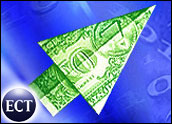
U.S. e-commerce sales rose more than 25 percent year over year in the first quarter, setting a record level for a non-holiday quarter of nearly US$12 billion.
Specifically, sales were estimated at $11.921 billion, a 25.9 percent increase over the same period in 2002, when sales totaled $9.47 billion. As expected, sales were well off the fourth quarter of 2002, when they set a record of $13.7 billion.
Bigger Bite
E-commerce sales continued to outpace overall retail purchases. Total retail sales rose just 4.4 percent year over year. As a result, e-commerce captured 1.5 percent of all sales, the biggest fraction ever in a non-holiday quarter.
In fact, e-commerce has posted consistent double-digit gains throughout the economic slump. Only once since 2000 have sales grown less than 20 percent in a quarter.
U.S. Census Bureau spokesperson Carol King told the E-Commerce Times that the data is based on a survey of some 11,000 U.S. retailers and is subject to revision and adjustment based on seasonal changes.
“We often make adjustments, but it’s unlikely to have any material impact on the data,” she said. “The bottom line is strong growth that doesn’t show any signs of letting up.”
Looking Ahead
In total, the Census Bureau reported that e-tail sales for all of 2002 came in at $45 billion.
Private research provides an even more optimistic view of the state of e-commerce. A recent report from Shop.org and Forrester Research estimated that 2002 e-commerce sales totaled $76 billion, a growth rate of nearly 50 percent compared with 2001.
In addition, the Shop.org study predicted e-commerce is poised to record another milestone this year by breaking the $100 billion sales level. The data Forrester collects includes online travel and other categories not counted by the Census Department.
Forrester Research analyst Carrie Johnson told the E-Commerce Times that e-tailers have been aggressive in offering discounts and special offers, such as free shipping.
“All this growth came despite a very shaky climate,” Johnson said, noting that consumer confidence plunged during the quarter, which was also marked by war with Iraq. “Deals and aggressive marketing even helped travel sales, despite the war and SARS fears.”
Banner Year
Those same factors will drive growth during the rest of the year, according to Johnson. Although the influx of new online shoppers has slowed considerably — Forrester estimates that only 6.8 million households will purchase an item online for the first time this year — more experienced e-shoppers are venturing into new, and in many cases more lucrative, markets, such as home furnishings.
“Those factors make the $100 billion level achievable,” Johnson said, adding that any significant economic upturn, which some economists now say is possible by year-end, will help propel e-commerce to new heights.

















































Social Media
See all Social Media